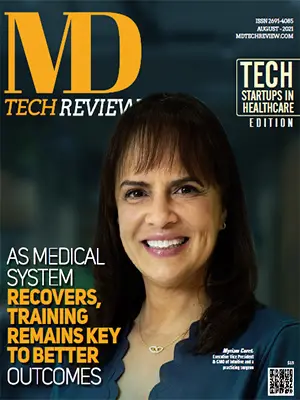 George Reigeluth, Founder & CEO
George Reigeluth, Founder & CEOProsumer Health’s (PH) Individualized Health Platforms (IHPs) represent such a system.
The IHPs collect, refine and analyse data about the patient’s chronic diseases and acute symptoms and produces guidance options to help them engage in their care and health in a more accurate, convenient and ongoing manner. Easily accessible on a smartphone, this smart telehealth system allows seamless communication between patients, providers, and health coaches who are available 24/7 with in-app texting to help coordinate patients' care with their health team.
Pulling together advances made in several domains such as HIT, AI/MLS, RPM, telehealth, but also the data, learning, decision, and cognitive sciences and behavioural psychology/economics, the PH IHPs can literally be individualized healthcare delivery systems for each person. By individualizing and integrating each person’s care and health resources on one comprehensive health platform, IHPs enable better decision making by clinicians, patients, the patient’s health coach and other member of the person’s health team– leading to earlier detection and prevention, fewer preventable medical mistakes, better health outcomes and lower costs. "As patients become the prosumers of health in this changing healthcare landscape, we have put together an integrated system that brings together all the resources that patients and providers and health coaches and other members of the new health team need to make better healthcare decisions," says George Reigeluth, Founder & CEO, Prosumer Health.
In an interview with MD Tech Review Magazine, Reigeluth shares insights about the platform and how it can benefit patients, providers, and payers.
How does Prosumer Health’s IHP help patients throughout their healthcare journey? What are some of the benefits they are getting from it?
We have built a system that integrates the patient’s information into one platform and provides individualized healthcare delivery. Think of our IHP as a super app that gives patients all the necessary tools they need to manage their health and healthcare. Our system collects patient data and sends it to the patient, provider, and health coach before the smart telehealth call. In this way, rather than spending time on the call asking questions and collecting data, the time on the call can be spent much more productively by discussing in shared decision-making.
For example, before a smart telehealth call occurs between a patient and physician, the physician has received all the data about the patient's hypertension or blood pressure problem. Without wasting time on these data issues, the physician can directly discuss and recommend the available guidance options with the patient. Then the health coach can get involved and help the individual execute and implement what is decided on the call.
Please shed some light on how Health Prosumer's platform can help providers reduce their burnout rate and enable payers to save their costs.
Clinician burnout is present and getting worse first because we have asked clinicians to do tasks that are humanly impossible – e.g. remember all of a patient’s data.
Think of our IHP as a super app that gives patients all the necessary tools they need to manage their health and healthcare
The PH IHPs help reduce clinician burnout by establishing a new division of labour by taking many of the data collection, data recall, refinement, analysis, guidance option, and documentation preparation off their hands. This task shifting results in fewer preventable care and health errors, fewer malpractice suits, better patient engagement, early detection, prevention and management of chronic diseases, lower health care costs, and more peace of mind for clinicians.
The result is a new partnership relationship between clinicians and their patients with patients having the tools to become more involved in their health and clinicians being able to practice at the top of their license.
PH IHPs also help clinicians move from Fee for Service payment systems to Value-based payment systems by giving clinicians and patients the data, tools, and human support to improve patient health outcomes which leads to a reduction in the use of healthcare services and costs.
On the payer side, the PH IHP system drives down healthcare costs in a number of different ways. First, with the more comprehensive data and ongoing monitoring of health conditions, patients detect emerging new acute and chronic care issues– all of which leads to better prevention and slowing down of disease progression. Second, the same set of resources leads to better management of existing chronic diseases and to fewer preventable medical mistakes, such as diagnosis or treatment mistakes, adverse events and complications. As a result, health outcomes are better, use of health care services is reduced by up to 60 percent and associated costs by up to 40 percent. PH IHPs are a win-win-win for patients, providers, and payers, both on the employer side and on the government Medicare and Medicaid side.
Could you cite a customer success story?
One of our clients in her 50s was suffering from three chronic diseases: obesity, hypertension, and type two diabetes. Her son was suffering from uncontrolled asthma. Before joining her PH IHP, she was sometimes getting the wrong advice regarding acute and chronic care issues which caused frequent ER, hospital and other clinic visits. All this was slowly turning into a vicious cycle for the family.
To address her care and health issues, she decided to join the Prosumer Health IHP system. She met her health coach, who collected her data, set her health goals and care plan. Then, she started using her IHP on a daily basis with support through in app texting from her health coach about doing her chronic disease measures with her RPM devices, responding to any messages sent to her apps by the AI-engine.
For example, she might receive a blood glucose reading that was too low and headed in the wrong direction, indicating that she might be at risk to have hypoglycemia. The AI analytics engine, sends a series of refinement questions from the literature to her smart phone. Her answers are analysed by the AI engine in the context of the relevant peer reviewed literature to produce a set of guidance options.
This quick, efficient process helped her detect the early signs of a hypoglycemic event, which could have led to her being hospitalized. With the help of her PH IHP, she detected an emerging problem earlier than otherwise would have been the case, and prevented the progression of the problem, saving her health, and her family's well-being.
What have you envisioned for the future of Prosumer Health?
Currently, we are focusing on two sub-markets. The first category is the underserved communities who do not have proper access to healthcare and are generally served by the community health centers and Indian Health Centers. The other market that we are focusing on is the employees— under their employer's health plan—who suffer from chronic diseases, which causes employees to lose days of work, disrupts work and team project schedules and cost the companies and the employees .
By taking these comprehensive, integrated and individualized set of resources out to each person in their own circumstances of life, family, work and health, each person is able to find their own path to health that suits them best. As a result, people are much more willing to engage in their health and care. This will be done with the help of a health coach who develops a close relationship with the patients and helps them connect to community-based social services.
Finally, we hope to start engaging school aged children with IHPs to address the alarming rise in childhood prevalence of multiple chronic diseases such as respiratory diseases. In this way, PH IHPs can help America begin to build a culture of health from early age throughout someone’s life. We are very excited about this!
Company
Prosumer Health
Headquarters
Hartford, CT
Management
George Reigeluth, Founder & CEO
Description
The company provides an AI-guided Individualized Health Platform (IHP) that integrates a patient's health drivers and resources in one place to help them engage in a meaningful and constructive manner in making their care decisions




